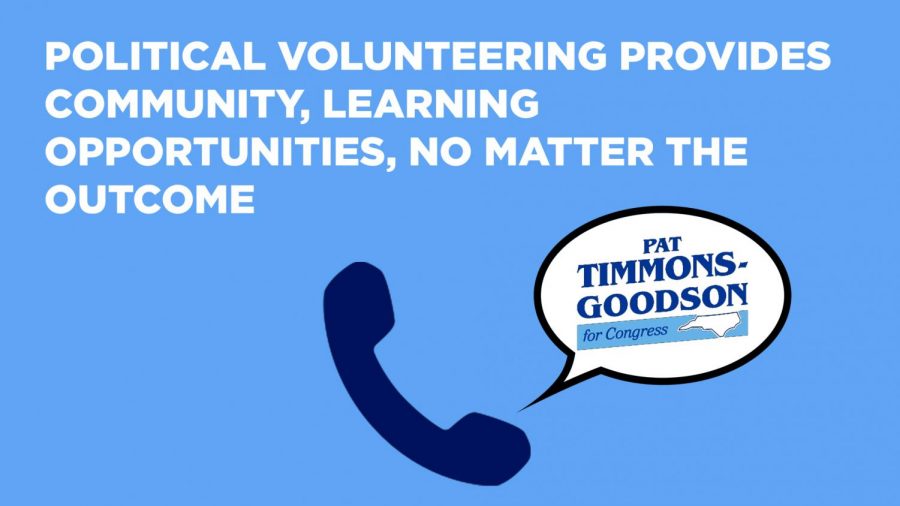Political volunteering provides community, learning opportunities, no matter the outcome
November 12, 2020
I was expecting the weekend before election day to be incredibly hectic. I had procrastinated on college applications as long as I possibly could and I had signed up for a full weekend of Get Out the Vote for the congressional campaign of Patricia Timmons-Goodson in North Carolina.
From what I could tell on Friday night, I was looking at two straight days of work, whether I was drafting supplemental essays or frantically calling hundreds of voters in Cumberland County. That was the plan, at least, until I let my fellow volunteer, Karin, know about my packed schedule.
“I know you want to save democracy too, but can you focus on those applications, please?” Karin tweeted back at me. With her assistance, I had people committing to volunteer in my stead within an hour.
And while Karin’s help stood out to me as a particularly generous gesture in the face of a daunting few days, it was not out of place in the culture of Timmons-Goodson’s campaign. From my first shift texting voters on an October weekend, to my hundreds of calls made to voters, the people that I campaigned with had each others’ backs every step of the way.
I volunteered for many candidates across the country over the last few months of this election, from Naperville to Nevada and Little Rock to San Antonio. All of them had admirable camaraderie, drive and an amazing candidate at the lead. Because Covid-19 had made virtual campaigning the norm, all it took to sign up to volunteer across the country was a quick trip to a candidate’s website.
But something special drew me to the Timmons-Goodson campaign. Maybe it was their liberal use of emojis on Slack, our campaign’s messaging platform, or the scheduled selfie breaks during Get Out the Vote. Either way, I had found my organizing home for the next month.
Throughout my process of volunteering for Pat Timmons-Goodson for Congress, everyone I spoke to— staff, fellow volunteers, voters— I learned something from. Erin, our field director, taught me to leave it all out on the field. Gibson, the campaign’s designated hype man, showed me that organizing can be fun when you have friends by your side. (He’s probably the reason phone banking doesn’t give me heartburn anymore).
Everyone I worked with, whether it was for a month or only a day, gave me hope for the future.
In the end, the results out of North Carolina’s Eighth Congressional District were not what we had hoped for. Seeing the district colored in red on election night made me hurt for everyone I worked with and every voter I called. But, in the campaign’s last lesson to me, it was not all in vain. Erin made sure to remind us.
“I hope that you know how much you’ve given to so many,” Erin said. “You helped expand the electorate. You helped fight voter suppression. You helped give 175,000 people a voice.”
When I was phone banking for our early voting outreach, I spoke to a 102-year-old woman who lived outside of Fayetteville. She told me she had voted in every election since the Voting Rights Act passed in 1965. I told her about Timmons-Goodson and let her know where her polling place was.
“Me and my wheelchair will get down there tomorrow morning, and I’ll remember Miss Pat’s name,” she told me.
Erin’s reassurance reminds me of that woman.
I feel incredibly lucky to have had the chance to speak with her, to learn that she was one of the 175,000. Ensuring that voters like her have their voices heard will keep me on the field my whole life, win or lose.





